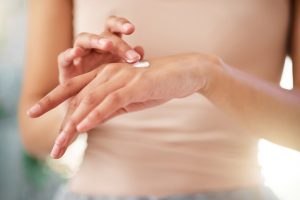 Eczema is a common skin condition characterized by patches of itchy, dry, blistering skin. It affects approximately 31 million Americans and up to 20% of all infants. The symptoms of eczema can range from mild to severe, often occurring in periodic “flare-ups” that cause them to temporarily worsen before subsiding.
Eczema is a common skin condition characterized by patches of itchy, dry, blistering skin. It affects approximately 31 million Americans and up to 20% of all infants. The symptoms of eczema can range from mild to severe, often occurring in periodic “flare-ups” that cause them to temporarily worsen before subsiding.
While effective treatments for eczema such as steroid injections, oral medications, and even light therapy are available, many cases are treated through over-the-counter topical skin care products such as lotions, moisturizers, antihistamines, pain relievers, topical hydrocortisone, and shampoo.
These types of products can help prevent flare-ups of eczema by hydrating the affected areas of your skin and reducing inflammation. They often include ingredients such as:
- Aloe
- Glycerin
- Hyaluronic acid
- Vitamin E
- Petrolatum
- Humectants
- Niacinamide
However, not all lotions, moisturizers, fragrances, or other skin care products may be beneficial for eczema-affected skin, as certain common ingredients can cause or worsen flare-ups, even if they’re beneficial for other types of skin conditions. These include:
- Ethanol and alcohol
- Lanolin
- Propylene glycol
- Retinoids
- Essential oils
- Urea
If you’re suffering from eczema, it’s best to work with a dermatologist that can help you find the most effective treatment options for your condition. You can schedule an appointment with a dermatologist at Flushing Hospital Medical Center’s Ambulatory Care Center now by calling (718) 670-5486.
All content of this newsletter is intended for general information purposes only and is not intended or implied to be a substitute for professional medical advice, diagnosis or treatment. Please consult a medical professional before adopting any of the suggestions on this page. You must never disregard professional medical advice or delay seeking medical treatment based upon any content of this newsletter. PROMPTLY CONSULT YOUR PHYSICIAN OR CALL 911 IF YOU BELIEVE YOU HAVE A MEDICAL EMERGENCY.

